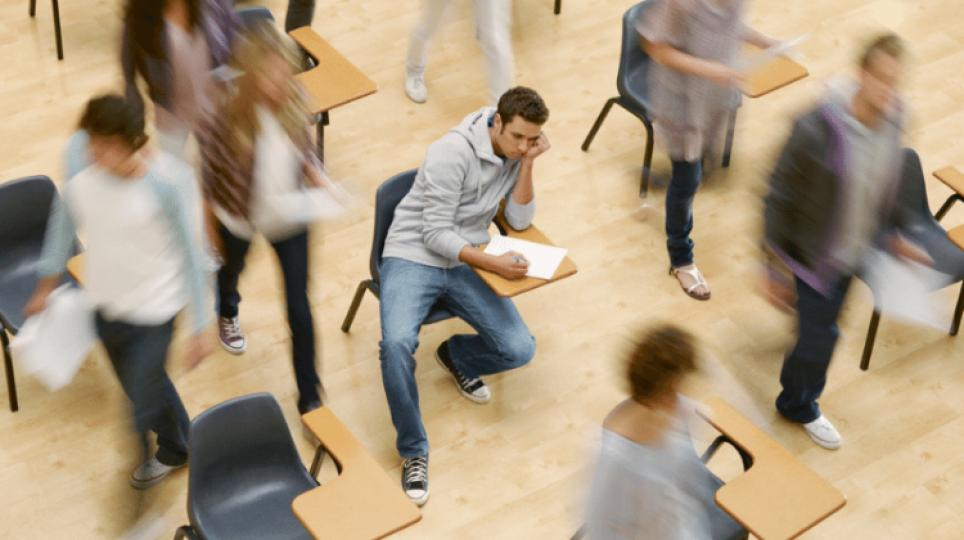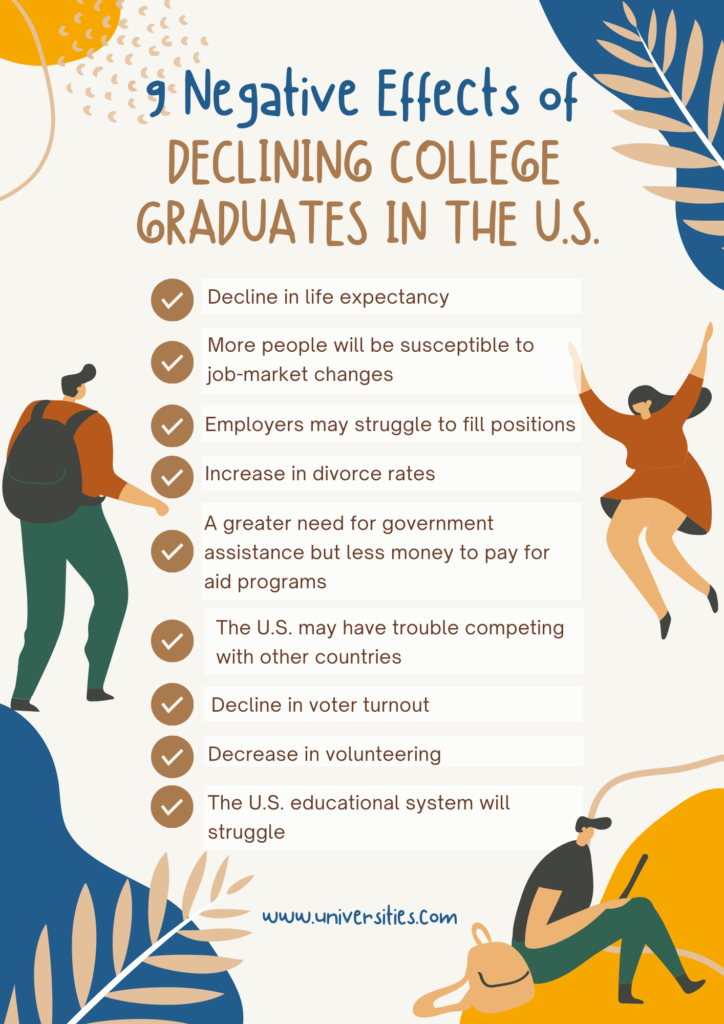
Most people know the profound effect graduating from college can have on someone’s life. A postsecondary degree can have many positive effects on a college graduate:
- A wider variety of career paths and job opportunities
- The likelihood of better financial prospects – nearly $25,000 a year more in earnings for someone with a bachelor’s degree compared to counterparts who only graduated high school
- A broader life view on ideas, cultures, and education subjects
- Stronger social and interpersonal skills
- Many more
The impact of a college education, however, reaches far beyond the individual level. Society as a whole has a vested interest in creating a highly educated population. Thus, statistics showing an enrollment decline of 5.1 percent (938,000 students) since Fall 2019 raises eyebrows.
It Started Before COVID-19
Before we go pinning all the blame on the COVID-19 pandemic, you should realize that postsecondary enrollment figures have been trending downward for nearly a decade. Declining birth rates have led to fewer prospective college students.
Also, public opinion about the value of a college education has shifted. While a Gallup poll in 2013 reported 70% of Americans saying a college education was “very important,” that figure fell to 51% in the 2019 poll. Making matters worse, the group with the lowest opinion of the importance of college was the 18- to 29-year-olds – people at the prime life-stage for enrollment.
Making matters worse, the group with the lowest opinion of the importance of college was the 18- to 29-year-olds.
So what might be in store for America if it keeps turning out fewer and fewer college graduates? According to The Hechinger Report – a national nonprofit newsroom that covers educational topics — a variety of potential problems could result that affect our society as a whole.
Nine Potential Effects Of A Decrease In College Graduates
1. Employers may struggle to fill certain positions.
Lawyers, doctors, nurses, educators, scientists, engineers . . . society depends on the services of a variety of highly educated people. Fewer individuals going to college likely spells worker shortages in numerous critical industries that require a college degree. Further aggravating the situation is that more and more Baby Boomers are retiring each day. Without a steady pipeline of incoming qualified individuals, who will fill their spots?
This situation already plagues America’s K-12 schools with the current teacher shortage. Statistics show enrollment in teacher preparation programs nationwide has declined by more than a third since 2010.
In addition, the COVID-19 pandemic further complicated matters as many veteran teachers opted to retire rather than face safety concerns or relearn how to teach in a remote learning environment. By 2024, experts predict there will be a demand for 300,000 new teachers nationwide and a supply of just over 100,000.
Nursing is another field that is in desperate need of workers as the nursing shortage continues to persist.
2. More people will be susceptible to job-market changes.
Need proof that we live in a fast-changing world? A report from Dell Technologies and the Institute for the Future estimates that 85% of the jobs that will exist in 2030 haven’t even been invented yet. How can society prepare for such ambiguity and advancement?
College not only trains students for specific current careers, it teaches them general interpersonal and professional skills. People who understand numbers, communicate effectively, apply logic, and know how to problem solve can use these abilities in a variety of situations or careesr. Plus, the experience of “learning how to learn” sets up graduates as highly trainable for whatever jobs the future brings.
3. A greater number of citizens will need government assistance, but we’ll have fewer tax dollars coming in to pay for aid programs.
According to the U.S. Census Bureau, those with a high school diploma or less make up the majority of government assistance recipients. Over half of the participants in WIC (the Special Supplemental Nutrition Program for Women, Infants, and Children) lack any postsecondary experience.
Likewise, people with only a high school diploma or lower make up about three-quarters of SSI (Supplemental Security Income) recipients. Given these current stats, it seems reasonable to project that falling college enrollment may lead more U.S. citizens to turn to these social safety nets in the future.
Financing the programs, however, could prove tricky. Workers in high-income jobs pay more in taxes, which fund these programs. An increase in the number of unemployed individuals or people only qualified for low-paying positions translates into the government receiving fewer tax dollars. Government officials will face unpleasant dilemmas such as
- Whether to enact stricter qualifications for things such as food stamps and public housing
- Put a heavier tax burden on wealthier segments of the population
- Take on more national debt

4. The U.S. may have trouble competing with other countries.
Countries with educated citizens thrive in our ever-changing world. Lagging behind other nations in terms of postsecondary output could spell trouble. Global business firms may choose to relocate outside of the United States in places with a more educated workforce and, subsequently, a stronger economy. This action means fewer jobs for Americans.
A lack of college graduates in STEM fields could prove especially harmful. Without a strong candidate pool from which to draw, U.S. firms may need to outsource high-skilled (and high-paying) tech jobs overseas. Low enrollment also means less people experiencing a vibrant community in which innovation and scientific discovery thrive. America risks losing its place as a global advancement powerhouse.
Evidence of the U.S. slipping in competitiveness is already mounting. The U.S. ranked 10th in the IMD World Competitiveness Center’s 2021 report – its lowest placement ever.
5. Life expectancy rates may decline.
According to a study done by researchers at University of Southern California (USC) and Princeton University, college graduates are living approximately three years longer than adults without a degree. A variety of factors may contribute to this finding, such as:
6. Divorce rates may increase.
Many modern marriages end regardless of the couple’s educational level. However, information collected by the CDC’s National Center for Health Statistics (NCHS) shows a link between a college education and a lasting marriage.
Researchers estimate that 78% of college-educated women who married for the first time between 2006 and 2010 could expect their marriages to last at least 20 years. This figure drops to 40% for women with a high school education or less. Similar stats exist for men – 65% for those with a bachelor’s degree vs. 50% without.
7. Voter turnout may decrease.
Active citizens help democracy thrive. A college education encourages thinking about important issues and making one’s voice heard. In the 2020 presidential election, the U.S. Census Bureau reports a turnout of 55.5% for high school graduates and a turnout of 77.9% among those with a bachelor’s degree. And if you think this race was unusual, note that similar turnout trends by education have occurred for decades.
8. Fewer people will volunteer.
The U.S. Bureau of Labor Statistics reports a direct correlation between educational attainment and volunteerism rates. College graduates lead the way with more than 40% performing volunteer work. They are followed by those with associate degrees or some college, who post a rate of about 31%. Fewer than 20% of adults with only a high school diploma volunteer, and that rate falls to 9% among people who did not graduate high school.
Why the higher rates for college graduates? It’s possible that postsecondary studies may instill in them a greater sense of one’s civic duty to help out. Some may have first participated in volunteer activities through fraternities, sororities, or other campus groups and want to continue the experience as adults. Also, college graduates tend to work at jobs with more scheduling flexibility, which may make committing to volunteer activities easier.
9. The U.S. educational system will struggle.
Fewer students attending college means institutions of higher learning may experience difficulty remaining open. Schools cannot continue to operate when they do not maintain sufficient attendance.
All sorts of employees – from cafeteria workers and landscapers to lab assistants and professors – risk losing their jobs if this happens. Similarly, the economy in and around college towns will suffer from the lack of activity.
For those who do stay open, the student experience may suffer. Budget cuts frequently result in actions such as:
- Fewer sections of classes
- Unattractive teacher to student ratios
- Elimination of less popular majors
- Fewer extracurricular clubs and activities
- Reduced athletic programs
- Postponement of upgrades to buildings and dormitories
Lastly, schools barely staying afloat may not have sufficient funds available to help students who require institutional financial aid in order to attend. Colleges may not be able to afford bringing aboard qualified low-income students. This lack of assistance would impact who gets to pursue a higher education, limiting attendance to those who can afford it.
And when we as a nation stop providing opportunities for ambitious individuals to go after their dreams, the very core of what America was built on collapses.
